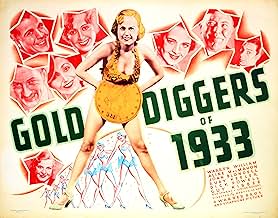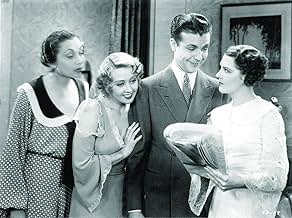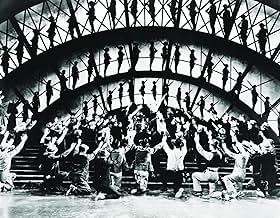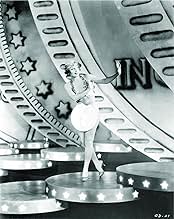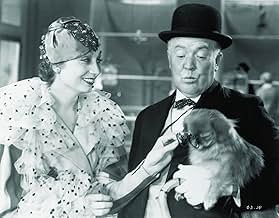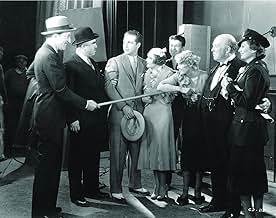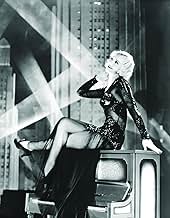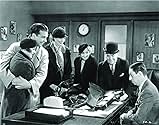AVALIAÇÃO DA IMDb
7,7/10
9,6 mil
SUA AVALIAÇÃO
Um compositor rico resgata artistas desempregados da Broadway para uma nova obra.Um compositor rico resgata artistas desempregados da Broadway para uma nova obra.Um compositor rico resgata artistas desempregados da Broadway para uma nova obra.
- Direção
- Roteiristas
- Artistas
- Indicado a 1 Oscar
- 4 vitórias e 1 indicação no total
Robert Agnew
- Dance Director
- (não creditado)
Loretta Andrews
- Gold Digger
- (não creditado)
Monica Bannister
- Gold Digger
- (não creditado)
Bonnie Bannon
- Gold Digger
- (não creditado)
Joan Barclay
- Gold Digger
- (não creditado)
Anita Barnes
- Gold Digger
- (não creditado)
Billy Barty
- Baby in 'Pettin' in the Park' Number
- (não creditado)
Busby Berkeley
- Call Boy
- (não creditado)
Bonnie Blackwood
- Chorus girl
- (não creditado)
Eric Blore
- Clubman
- (não creditado)
Avaliações em destaque
With the success of "42nd Street," Warner Brothers wasted no time adding Busby Berkeley musical numbers to "Gold Diggers of 1933."
Starring Dick Powell and Ruby Keeler, this musical also has some of the same Depression darkness that permeated "42nd Street." "It's the Depression, dearie," Ginger Rogers says as the show she and her fellow chorines are laboring in closes in rehearsal due to lack of funding.
However, Brad (Powell), a composer in a nearby apartment who's sweet on Polly (Keeler), offers to give Ned Sparks the money he needs to produce his new show. His only condition is that Polly be featured.
Everyone wonders where he got the money, and a news item plus the fact that he refuses to appear in the show make the girls suspicious that he's a bank robber. In fact, he's the scion of a wealthy man (Warren William), who soon appears on the scene with his attorney (Guy Kibbee) when Brad steps in for the lumbago-ridden juvenile lead.
Polly's roommates Trixie and Carol (Joan Blondell and Aline MacMahon) go to work on the two immediately.
Though the film has some fantastic numbers - "We're in the Money," "The Shadow Waltz," "Pettin' in the Park," and great Busby Berkeley choreography, the middle section has no music and drags on as the gals meet the men, get them to pay for expensive hats, etc. This is probably because the film was completed when the musical numbers were added.
But the final number is worth the whole film. "Remember Your Forgotten Man" is a tribute to the World War I soldiers now out of work in the Depression, and not only are the production effects and choreography fantastic, but the singing as well, particularly the solo work by Etta Morton. Blondell, who from the sound of it in Dames was completely tone deaf, is beautifully dubbed here.
Ginger Rogers shines in a supporting role especially with her pig Latin lyrics to "We're in the Money" which were added after she was heard fooling around in a rehearsal. Powell is in gorgeous voice in all the numbers, but "I've Got to Sing a Torch Song" is a high point.
It's easy to watch the dancing, the beautiful women in their costumes, and listen to the singing and forget what in fact was going on in the '30s - after all, that's why these films were made.
But the "Forgotten Man" number serves as a reminder then and today that for the people sitting in the theaters, their troubles were right outside the door.
Starring Dick Powell and Ruby Keeler, this musical also has some of the same Depression darkness that permeated "42nd Street." "It's the Depression, dearie," Ginger Rogers says as the show she and her fellow chorines are laboring in closes in rehearsal due to lack of funding.
However, Brad (Powell), a composer in a nearby apartment who's sweet on Polly (Keeler), offers to give Ned Sparks the money he needs to produce his new show. His only condition is that Polly be featured.
Everyone wonders where he got the money, and a news item plus the fact that he refuses to appear in the show make the girls suspicious that he's a bank robber. In fact, he's the scion of a wealthy man (Warren William), who soon appears on the scene with his attorney (Guy Kibbee) when Brad steps in for the lumbago-ridden juvenile lead.
Polly's roommates Trixie and Carol (Joan Blondell and Aline MacMahon) go to work on the two immediately.
Though the film has some fantastic numbers - "We're in the Money," "The Shadow Waltz," "Pettin' in the Park," and great Busby Berkeley choreography, the middle section has no music and drags on as the gals meet the men, get them to pay for expensive hats, etc. This is probably because the film was completed when the musical numbers were added.
But the final number is worth the whole film. "Remember Your Forgotten Man" is a tribute to the World War I soldiers now out of work in the Depression, and not only are the production effects and choreography fantastic, but the singing as well, particularly the solo work by Etta Morton. Blondell, who from the sound of it in Dames was completely tone deaf, is beautifully dubbed here.
Ginger Rogers shines in a supporting role especially with her pig Latin lyrics to "We're in the Money" which were added after she was heard fooling around in a rehearsal. Powell is in gorgeous voice in all the numbers, but "I've Got to Sing a Torch Song" is a high point.
It's easy to watch the dancing, the beautiful women in their costumes, and listen to the singing and forget what in fact was going on in the '30s - after all, that's why these films were made.
But the "Forgotten Man" number serves as a reminder then and today that for the people sitting in the theaters, their troubles were right outside the door.
This, the first in the series of Gold Diggers films still in existence, is the best, the sparkiest, the funniest, and the strongest. Ruby Keeler, Joan Blondell, Aline MacMahon, Dick Powell, Guy Kibbee, Warren William, Ginger Rogers, and then some ... what a great cast! Wonderful musical numbers with that distinctive Berkeley choreography. A crackling script which still packs a punch now. And, best of all, that wonderful finale 'Forgotten Man', where Great War veterans shuffle through a world that doesn't care while the women left behind remember their happier days ...
This is the most perfect example of "history on the silver screen" that I can think of. When Ginger Rogers says, "It's the Depression, dearie" at the beginning to explain the chorus girls' bad luck, it's the key to the whole film. While the "Shadow Waltz" number was being filmed during an actual 1933 earthquake in L.A. a number of the girls toppled off the Art Deco "overpass" where they were swaying with their filmy hoop skirts and their neon violins short-circuited. The electrical hook-ups were also rather dangerous, especially if the neon bows came in contact with the girls' metallic wigs in that number. The culminating production number, "Remember My Forgotten Man," is the most significant historically and illustrates Warner Bros.' "New Deal" sensibilities. Warner Bros. was the only studio that "bought" the whole Roosevelt approach to economic recovery. The year before, under Hoover, WWI vets were not only neglected in terms of benefits but were run out of their shanty town near the Capitol building. Starving guys were camping on the edges of most communities who'd served in the Great War fifteen years before. Of course, why or how this number fits into such a '30s girlie-type musical revue is anyone's guess. Berkeley never looked for reality, just eye-popping surrealistic effects.
About ten years ago I found myself sitting next to Etta Moten Barnett at a Chicago NAACP banquet. I was flabbergasted. She was in her 90s yet still looked lovely. She's the singer who sang "Forgotten Man" in the window. She also sang "The Carioca" in Astaire and Rogers' first pairing, "Flying Down to Rio." She was quite gracious, though she did not have wonderful things to say about Hollywood of that era. The African Americans in both pictures were fed in a tent away from the general commissary area.
Ruby Keeler has a certain odd-ball appeal, like a homely puppy. She can't sing, she watches her leaden feet while she dances, and almost all her lines are read badly. Yes, she was married to Al Jolson, but that may have HURT her career more than anything. He was not exactly always likable. He was much older than Ruby and so full of himself.
This film is also a classic example of the PRE-CODE stuff that was slipping by---the leering "midget baby" (Billy Barty), the naked girls in silhouette changing into their "armor," the non-stop flashing of underwear or lack of underwear, Ginger Rogers having her large coin torn off by the sheriff's office mug so she's essentially standing there in panties, and so forth.
A good comparison of before and after the code would be to examine this picture and "Gold Diggers of 1935." The latter is so much more chaste, discreet, and less fascinating except for the numbers. There's not the lurid, horny aura of the Pre-Code pictures. And it's not quite as much naughty fun, either.
About ten years ago I found myself sitting next to Etta Moten Barnett at a Chicago NAACP banquet. I was flabbergasted. She was in her 90s yet still looked lovely. She's the singer who sang "Forgotten Man" in the window. She also sang "The Carioca" in Astaire and Rogers' first pairing, "Flying Down to Rio." She was quite gracious, though she did not have wonderful things to say about Hollywood of that era. The African Americans in both pictures were fed in a tent away from the general commissary area.
Ruby Keeler has a certain odd-ball appeal, like a homely puppy. She can't sing, she watches her leaden feet while she dances, and almost all her lines are read badly. Yes, she was married to Al Jolson, but that may have HURT her career more than anything. He was not exactly always likable. He was much older than Ruby and so full of himself.
This film is also a classic example of the PRE-CODE stuff that was slipping by---the leering "midget baby" (Billy Barty), the naked girls in silhouette changing into their "armor," the non-stop flashing of underwear or lack of underwear, Ginger Rogers having her large coin torn off by the sheriff's office mug so she's essentially standing there in panties, and so forth.
A good comparison of before and after the code would be to examine this picture and "Gold Diggers of 1935." The latter is so much more chaste, discreet, and less fascinating except for the numbers. There's not the lurid, horny aura of the Pre-Code pictures. And it's not quite as much naughty fun, either.
Mervyn LeRoy directs this irresistible and touching depression-era musical. Busby Berkeley's choreography is as breath-taking as ever, as are the bevy of beautiful women in the elaborate productions. Many great musical numbers highlight this film including "We're in the Money" in which a then unknown, Ginger Rogers sings in Pig Latin. A host of other oddities can be found as always when Mr. Berkeley is involved. Ruby Keeler and Dick Powell are sensational as dancing and singing lovebirds and all works out well in the end. The show does close on a noticeably strange note with the very powerful protest number regarding the depression called "Forgotten Man" masterfully delivered by bombshell, Joan Blondell. A truly original and memorable musical.
with 42nd Street and Footlight Parade... Snappy, risqué, funny, great cast, great music. What more could you ask for? Joan Blondell, Aline McMahon, and Ruby Keeler are the gold diggers. Warren William, Dick Powell, and Guy Kibbee are their targets. Ginger Rogers is swell singing "We're in the Money" in Pig Latin. Ned Sparks, Sterling Holloway, Charles Lane, and Billy Barty are good. Great musical numbers including the opening "We're in the Money," the terrific finale "Forgotten Man" with Blondell and Etta Moten (singing in the window); "Petting in the Park" and "In a Shadow"---Powell and Keeler.... all classics. Fun all the way......
Look for Hobart Cavanaugh, Grace Hayle, Busby Berkley, Clarence Nordstrom, and one of the roller skating cops sure looks like Jack Carson.
Aline McMahon steals the show, and what a show it is!
Look for Hobart Cavanaugh, Grace Hayle, Busby Berkley, Clarence Nordstrom, and one of the roller skating cops sure looks like Jack Carson.
Aline McMahon steals the show, and what a show it is!
Você sabia?
- CuriosidadesDuring rehearsals of "We're in the Money", Ginger Rogers began goofing off and singing in pig Latin. Studio executive Darryl F. Zanuck overheard her, and suggested she do it for real in the movie.
- Erros de gravaçãoWhen Brad plays piano for Mr. Hopkins, his fingers don't match the sound of the piano.
- Citações
Trixie Lorraine: "Fanny" is Faneul H. Peabody, just the kind of man I've been looking for, lots of money and no resistance.
- ConexõesEdited into Busby Berkeley and the Gold Diggers (1969)
- Trilhas sonorasThe Gold Diggers' Song (We're in the Money)
(uncredited)
Music by Harry Warren
Lyrics by Al Dubin
Played during the opening credits and often in the score
Performed by Ginger Rogers (in English and Pig-Latin) and chorus
Played also as dance music by a band
Principais escolhas
Faça login para avaliar e ver a lista de recomendações personalizadas
- How long is Gold Diggers of 1933?Fornecido pela Alexa
Detalhes
- Data de lançamento
- País de origem
- Idioma
- Também conhecido como
- Cavadoras de Ouro de 1933
- Locações de filme
- Empresa de produção
- Consulte mais créditos da empresa na IMDbPro
Bilheteria
- Orçamento
- US$ 433.000 (estimativa)
- Faturamento bruto mundial
- US$ 105
- Tempo de duração
- 1 h 37 min(97 min)
- Cor
- Mixagem de som
- Proporção
- 1.33 : 1
Contribua para esta página
Sugerir uma alteração ou adicionar conteúdo ausente


